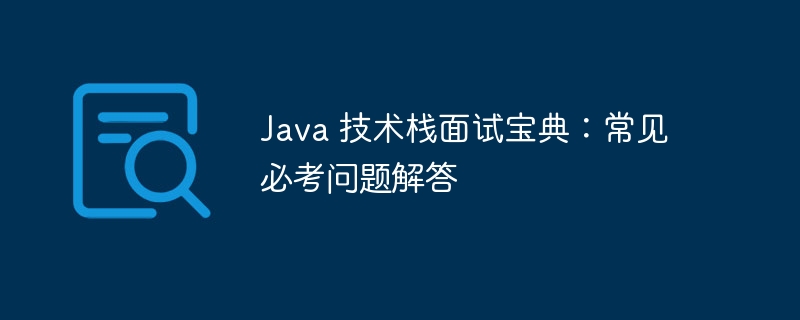
In the Java technology stack interview, common required questions involve multi-threading, collection framework, generics, JDBC and Spring framework. Mastering these questions can improve your interview success rate and understanding of Java technology. This article provides practical cases, covering: 1. Creating thread-safe counters; 2. Using collections to store and retrieve data; 3. Creating universal queues; 4. Using JDBC to connect to MySQL database; 5. Using Spring IoC for dependency injection.

Java Technology Stack Interview Guide: Answers to Frequently Asked Questions
In the Java technology stack interview, some questions are almost mandatory Taking the exam, mastering these questions will not only increase your interview pass rate, but also deepen your understanding of Java technology. This article will comprehensively answer common must-take questions from basic concepts to practical applications, and is equipped with practical cases to help you easily cope with interviews.
1. Java Multithreading
public class ThreadSafeCounter {
private int count = 0;
private Object lock = new Object();
public int increment() {
synchronized (lock) {
count++;
return count;
}
}
}2. Collection framework
ArrayList and HashMap to store and retrieve data: List<String> names = new ArrayList<>();
names.add("John");
names.add("Jane");
System.out.println(names.get(0)); // John
Map<Integer, String> ages = new HashMap<>();
ages.put(1, "20");
ages.put(2, "25");
System.out.println(ages.get(1)); // 203. Java Generics
public class GenericQueue<T> {
private List<T> elements = new ArrayList<>();
public void enqueue(T item) {
elements.add(item);
}
public T dequeue() {
return elements.remove(0);
}
}4. JDBC
Connection conn = DriverManager.getConnection("jdbc:mysql://localhost:3306/test", "root", "password");
Statement stmt = conn.createStatement();
ResultSet rs = stmt.executeQuery("SELECT * FROM users");
while (rs.next()) {
System.out.println(rs.getString("name"));
}5. Spring Framework
@SpringBootApplication
public class SpringBootApp {
public static void main(String[] args) {
SpringApplication.run(SpringBootApp.class, args);
}
@Bean
public UserService userService() {
return new UserServiceImpl();
}
}By mastering these common must-test questions and deepening it with practical cases By understanding, you can greatly improve your performance in Java technology stack interviews. Remember to express your answers clearly and provide specific examples to support your arguments.
The above is the detailed content of Java Technology Stack Interview Guide: Answers to Frequently Asked Questions. For more information, please follow other related articles on the PHP Chinese website!
